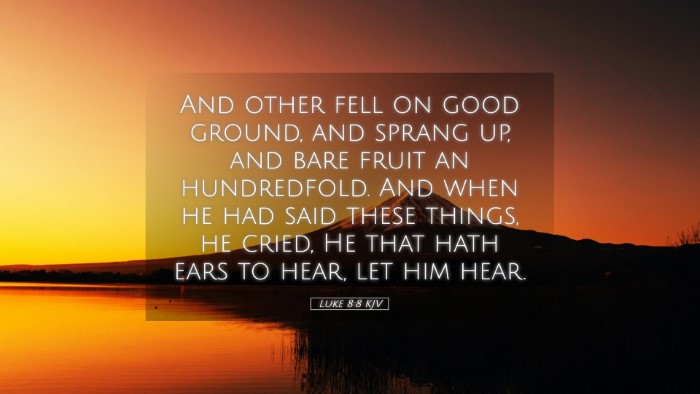Commentary on Luke 8:8
Verse: "And other fell on good ground, and sprang up, and bare fruit an hundredfold." (Luke 8:8 KJV)
Introduction
This verse is part of the Parable of the Sower, where Jesus shares profound truths about the reception of His word among different types of listeners. The diverse responses highlight the importance of the condition of the heart in receiving God's message.
Insights from Public Domain Commentaries
Matthew Henry's Commentary
Matthew Henry emphasizes the significance of the "good ground" that represents a heart prepared to receive the gospel. He notes:
- The Nature of Good Ground: The good ground symbolizes a heart that is soft, receptive, and free from the thorns of worldly distractions and the rocks of unfaithfulness.
- Spiritual Productivity: A heart in good condition not only receives the word but also bears fruit in abundance. Henry points out that the hundredfold yield illustrates the potential for spiritual multiplication and the blessings that come from a faithful response to God's Word.
- The Role of Grace: It is by God's grace that some hearts are made good for receiving the Word. This grace enables believers to persevere in their faith, leading to the ultimate harvest of righteousness.
Albert Barnes' Notes
Albert Barnes adds a more detailed interpretation regarding the conditions that contribute to the fruitful reception of God’s Word. He highlights:
- Preparation of the Heart: The good ground refers to a heart that has been cultivated through the work of the Holy Spirit. Such preparation involves repentance and the removal of obstacles that hinder faith.
- Faithful Perseverance: Barnes notes that the true disciple does not just hear the word, but retains it and persists in it. The notion of producing a hundredfold speaks to the idea that genuine faith has a tangible outcome.
- Measurement of Results: The emphasis on the hundredfold return signifies that the Kingdom of God yields results beyond human expectation. This underscores the transformative impact of the gospel in the believer's life.
Adam Clarke's Commentary
Adam Clarke sheds light on the symbolism of the parable while also applying practical theological implications:
- Symbolism of Fruitfulness: He interprets the fruit as good works, holy living, and the spirit of love that springs forth from a life touched by the gospel. Clarke stresses that this fruitfulness is not merely external but is a manifestation of inward transformation.
- The Abundance of God’s Blessing: Clarke observes that the expression "a hundredfold" suggests the unprecedented blessing of God on those who truly adhere to His teachings. This points to an overflowing joy and satisfaction that comes with following Christ.
- Application to Discipleship: He emphasizes that those who hear the word and respond positively must become active participants in disseminating that word, thus encouraging others to experience the same transformation.
Theological Reflections
Luke 8:8 invites a theological reflection on the nature of discipleship and the responsibility of believers to be good soil. As this verse conveys, the Gospel has an inherent power to transform lives, but this transformation requires a willing heart:
- The Heart's Condition: An examination of one's own heart is crucial. Have distractions and cares choked our faith? What can be done to cultivate a deeper receptivity to God's word?
- God's Faithfulness: The verse reassures believers that God desires an abundant harvest from our lives. It reflects His faithfulness to nurture the seeds He has sown in us.
- Community Impact: The fruit produced is not only for individual benefit but for the blessing of community and the world at large. Good soil produces a crop that nourishes others.
Conclusion
In summary, Luke 8:8 encapsulates the essence of fruitful Christian living—a life that not only hears the gospel but actively lives it out. The insights from the commentaries reveal the rich layers of meaning in this verse, offering valuable reflections for pastors, students, theologians, and scholars alike. The call to be good soil, prepared to receive and respond to the Gospel, continues to resonate throughout the ages, challenging and encouraging believers in their walk with Christ.


